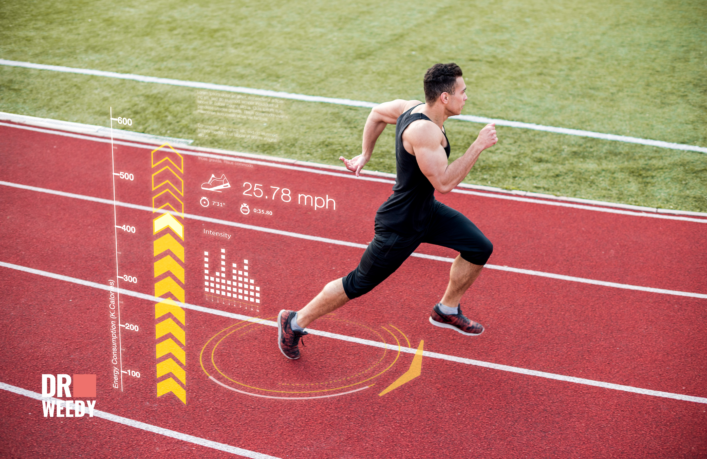Does Weed Impact Athletic Skills? Insights

Across gyms, fields, courses, and courts, a familiar scent is wafting in the air as increasing numbers of athletes are sparking up marijuana in pursuit of performance gains. Use among competitors currently sits around 25% recreationally with even Olympic talents like Richardson testing positive. Beyond elite performers, cannabis usage permeates down through collegiate locker rooms to weekend warriors looking to enhance their workouts.
Many Praise Enhanced Enjoyment, Focus, Motivation From Weed

Subjective benefits routinely touted include:
- Elevated enjoyment and motivation
- Improved ability to focus on the task at hand
- Fostering a soothing “runner’s high”
- Alleviating pain/inflammation from training
- Aiding sleep and recovery
Marijuana seemingly helps athletes relax, focus inward, and deeply enjoy their sports. And these psychological impacts indeed influence behaviors – when athletes feel good exercising and recovering, they often train more consistently. But does cannabis actually improve measurable physical capacity alongside the mood enhancement? The limited evidence explores this next.
Weed’s Impact on Performance: What We Know
Early cardiovascular and muscular endurance studies found concerning trends of cannabis:
- Limiting overall athletic capacity
- Impairing strength and endurance test results
Unlike directly performance-enhancing supplements like caffeine, marijuana does NOT currently appear to benefit power, speed, or motivation. However, strict laws continue obstructing controlled experiments to truly isolate weed’s impacts. Still, claims of cannabis acting akin to steroids boosting quantifiable abilities lack substantiation from sports science at this juncture.
Examining a Trailblazing Treadmill Study on Marijuana Impacts

The innovative study took a deeper look by assessing regular cannabis-using runners. Across both THC and CBD groups, leveraging marijuana increased reported:
- Enjoyment of the 30-minute moderate treadmill run
- Intensity of pleasurable “runner’s high” feelings
- Perceived focus and connection to the present moment
However, the THC subjects specifically described diminished running capability alongside greater difficulty completing the workout. This aligns with constrained athletic capacity from early research into marijuana.
These findings suggest useful psychological impacts on mood, enjoyment, and focus but likely no performance boost – participants felt they ran better but actually moved slower. So for now, cannabis seems more likely to enhance adherence than measurable fitness gains through these psychological effects rather than physiological enhancement.
Examining the Health Risk Considerations Around Mixing Weed and Exercise

While proponents speak glowingly of marijuana minimizing pain and speeding recovery, all exercising athletes should carefully consider meaningful health risks that still require elucidation through longer-term trials. Especially when smoking, cannabis damages lungs essential for endurance-dependent sports.
Additionally, marijuana can clearly damage:
- Motor control
- Reaction time
- Balance
These detriments heighten injury risks for agility-based sports demanding quick changes of direction like basketball, tennis, football, downhill skiing. Attempting complex pivots, cuts, and reaches with impaired coordination ups odds of non-contact sprains and falls. Moreover, little research has examined interactions between cannabis and critical needs like hydration, temperature regulation, and between-event recovery for tournament athletes spending long days competing.
Key Unanswered Questions for Sports Scientists
Currently athlete use outpaces scientific examination, leaving pressing questions about mixing cannabis and high-performance. Among underexplored considerations:
How do prolonged exertion and altered stress hormone levels interact with non-sober states? Could distorted hydration or heat regulation while exercising stoned jeopardize health in warm conditions?
With heavy usage, do patterns emerge linking weed and injury risks in pivoting/reacting sports like basketball, football, tennis?
Does cannabis truly hasten healing and recovery processes between intense training sessions and competitions?
Final Recommendations to Enhance Safety When Combining Cannabis and Exercise

While unlikely beneficial for quantifiable performance gains currently, interest persists among athletes utilizing cannabis for enjoyment, adherence, and recovery. Until further data guides decisions, those interested should consider:
- Avoid smoking to prevent lung damage
- Temper expectations around enhanced physical capacity
- Prevent dangerous combinations like skiing or biking stoned
- Monitor for signs marijuana increases injury rate
And all exercising enthusiasts should appreciate that mixing weed and workouts still warrants prudent caution – moderation remains advisable given lingering health questions for both recreational and competitive athletes.



























